✪ Key Highlight: New research reveals couples sharing junk food feel closer temporarily but damage long-term relationship satisfaction.
Introduction
That moment when you and your partner reach for the same bag of chips feels like pure connection.
New research from German, Swiss, and Canadian universities shows this shared indulgence creates temporary bonding but seriously damages relationships over time.
Hi, I’m Abdur, your nutrition coach and today I’m going to analyze this groundbreaking study about how couples eating junk food together affects their relationship satisfaction and long-term health outcomes.
Why Do Couples Feel Closer When Sharing Junk Food?
The brain chemistry behind shared junk food consumption creates a powerful but misleading connection between partners.
Clinical psychologist Nick Sharp explains that couples combine two potent neurochemicals when eating junk food together.
Dopamine floods your brain from the instant gratification of sugar, salt, and fat combinations found in processed foods.
Meanwhile, oxytocin releases during shared experiences, creating feelings of attachment and emotional closeness with your partner.
This neurochemical cocktail makes couples feel like they are on the same team, united against the world through their shared indulgence.
The research found that couples reported feeling more connected and satisfied in their relationships immediately after sharing unhealthy behaviors like eating fast food.
However, this connection acts more like a drug hit than genuine relationship building, providing temporary pleasure without lasting benefits.
✪ Fact: Dopamine from junk food creates the same brain response as addictive substances, making shared consumption feel bonding.
What Are The Long-Term Relationship Consequences?
The temporary high from shared junk food consumption quickly fades, leaving couples with decreased satisfaction over time.
Research published in studies examining mealtime behavior shows that couples relying on unhealthy eating patterns experience more depressive symptoms together.
When one spouse frequently eats fast food or dines alone, both partners suffer negative mental health impacts that extend beyond individual choices.
The study revealed that couples using junk food as a coping mechanism struggle to address real relationship issues effectively.
Instead of developing healthy communication skills, partners learn to avoid conflict through shared indulgence, creating a cycle of emotional avoidance.
Therapists report seeing increased tension and guilt between couples who engage in frequent binge eating together.
One partner might feel resentful or pressured to participate in unhealthy eating, while the other experiences guilt about initiating these shared behaviors.
✪ Note: Couples who rely on junk food for bonding often struggle with trust and communication issues long-term.
How Does This Pattern Affect Physical Health?
Shared junk food consumption creates a reinforcement cycle that makes healthy choices increasingly difficult for both partners.
When couples regularly indulge together, they normalize unhealthy eating patterns and reduce individual motivation for better choices.
The research shows that problematic behaviors like eating junk food, remaining inactive, or smoking become more entrenched when shared between partners.
Ultra-processed foods high in sugar, sodium, and unhealthy fats contribute to inflammation throughout the body, affecting both physical and mental health.
Regular consumption of these foods increases risk for obesity, diabetes, heart disease, and mood disorders that impact relationship dynamics.
The study found that couples sharing unhealthy behaviors experienced compounded negative health effects compared to individuals making similar choices alone.
This occurs because partners reinforce each other’s poor decisions while reducing accountability for healthier alternatives.
✪ Pro Tip: Partners who make healthy choices together show significantly better long-term health outcomes than those who indulge together.
What Should Couples Do Instead?
Building genuine connection requires couples to find sustainable bonding activities that support both relationship and individual health.
Experts recommend that partners engage in open conversations about their eating habits, triggers, and health goals together.
Planning and preparing healthy meals together creates the same shared experience benefits without the negative long-term consequences.
Couples can bond through physical activities like walking, dancing, or playing sports that release endorphins naturally and build lasting memories.
The key involves replacing instant gratification behaviors with activities that provide sustained satisfaction and mutual support.
Research shows that couples who cook nutritious meals together report higher relationship satisfaction and better communication skills over time.
These partners learn to support each other through challenges rather than avoiding difficult conversations through shared indulgence.
✪ Fact: Couples who cook healthy meals together show 40% higher relationship satisfaction than those who frequently order takeout.
The Bottom Line
Sharing junk food with your partner creates temporary connection through powerful brain chemicals, but this bonding method ultimately damages both your relationship and health over time.
Real love means supporting each other toward better health, not enabling harmful habits that feel good in the moment.
I would love to hear about your experiences with shared eating habits in relationships – please share your thoughts, questions, or feedback in the comment section below.
References
At NutritionCrown, we use quality and credible sources to ensure our content is accurate and trustworthy. Below are the sources referenced in creating this article:
- Food Bible: Experts Warning Couples Eat Junk Food Together
- Delish: Couples Junk Food Happier Study
- PMC: Mealtime Behavior and Depressive Symptoms in Late-Life Marriage
- Social Work Today: Binge Eating and Relationships
- British Psychological Society: Couples Feel Closer After Indulging Unhealthy Behaviours Together





